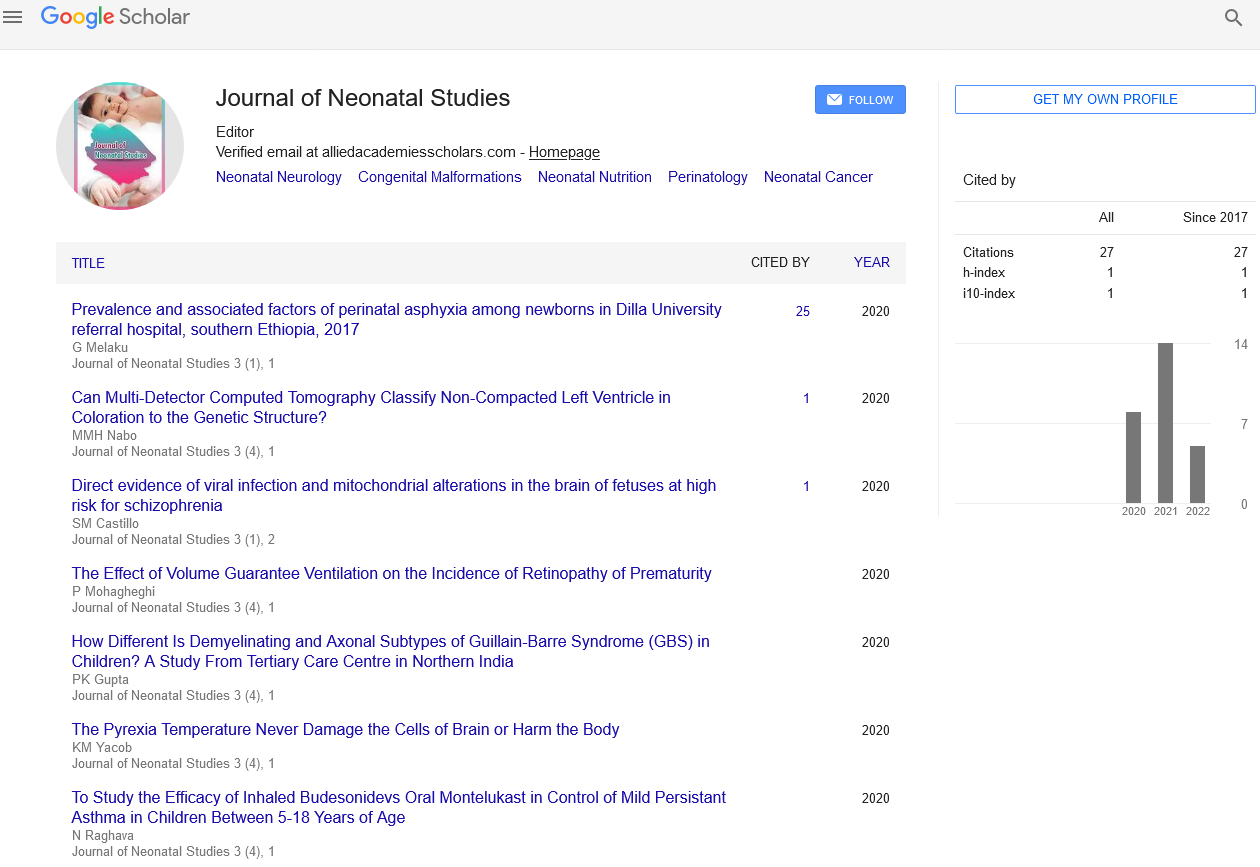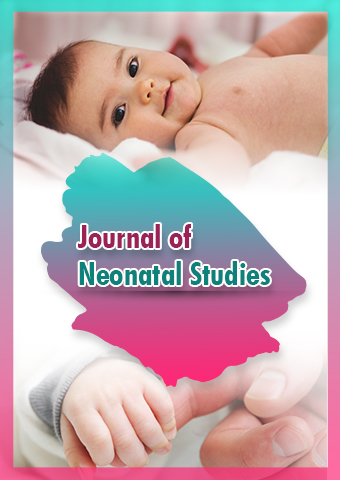Review Article - Journal of Neonatal Studies (2023) Volume 6, Issue 4
Neonatal Nursing: Nurturing the Tiniest Lives
Ajay Kumar Mishra*
Department of Stem Cell and Research, Mauritius
Department of Stem Cell and Research, Mauritius
E-mail: kumar678@gmail.com
Received: 01-Aug-2023, Manuscript No. jns-23-109485; Editor assigned: 2-Aug-2023, PreQC No. jns-23- 109485(PQ); Reviewed: 15-Aug-2023, QC No. jns-23-109485; Revised: 22-Aug-2023, Manuscript No. jns-23- 109485(R); Published: 29-Aug-2023; DOI: 10.37532/jns.2023.6(4).100-103
Abstract
Neonatal nursing is a specialized field of healthcare that focuses on providing comprehensive and compassionate care to newborns, particularly those born prematurely or with complex medical conditions. This abstract explores the critical role of neonatal nurses in nurturing and supporting the tiniest lives during the vulnerable period of infancy. Neonatal nurses play a pivotal role in the Neonatal Intensive Care Unit (NICU), where they assess, monitor, and manage the health and development of premature and sick neonates. The paper highlights the specialized skills and knowledge required for neonatal nursing, including respiratory support, nutrition management, and family-centered care. Furthermore, it emphasizes the importance of emotional support and communication skills in helping families cope with the challenges of having a newborn in the NICU. The abstract concludes with an overview of the evolving landscape of neonatal nursing, exploring advancements in technology, research, and interdisciplinary collaboration, all aimed at improving outcomes and nurturing the tiniest lives. Neonatal nursing plays a crucial role in providing specialized care and support to the most vulnerable members of our population - premature and critically ill newborns. With advancements in medical technology and increasing survival rates for premature infants, the demand for skilled neonatal nurses has never been greater. This paper explores the significance of neonatal nursing, its historical development, the challenges faced by neonatal nurses, and the essential role they play in nurturing the tiniest lives. By understanding the unique needs of neonatal patients and the specialized care they require, neonatal nursing can continue to evolve, ensuring that these fragile lives receive the best possible start in their journey towards health and well-being.
Keywords
Neonatal nursing • NICU • Newborn care • Premature infants • Neonatal intensive care • Family-centered care • Infant development • Respiratory support • Nutrition management • Interdisciplinary collaboration
Introduction
In the realm of healthcare, neonatal nursing stands as a specialized and vital field that focuses on the care and treatment of newborn infants. Neonatal nurses are skilled and compassionate professionals who work tirelessly to ensure the well-being of these fragile lives during their first few weeks or months outside the womb. These healthcare heroes play a critical role in promoting healthy development and providing essential medical interventions to infants facing various challenges, making a significant impact on the lives of countless families around the world. But for some families, it can also be fraught with fear and uncertainty. The birth of a premature or critically ill newborn can present complex medical challenges that demand specialized care and attention. Neonatal nursing, a subspecialty within the field of pediatrics, focuses on providing comprehensive care to these fragile infants during the critical early stages of life [1].
Over the years, the field of neonatal nursing has witnessed remarkable progress, largely due to advancements in medical science, technology, and research. Preterm infants, who once faced insurmountable odds, now have a fighting chance at survival, thanks to the dedication and expertise of neonatal nurses. These healthcare professionals not only administer life-saving treatments but also act as a source of comfort and support for both the tiny patients and their anxious families. This paper delves into the world of neonatal nursing, exploring its historical evolution and how it has become an indispensable component of modern healthcare systems. We will also examine the unique challenges faced by neonatal nurses, including emotional stress, long working hours, and the ethical dilemmas that arise in caring for these vulnerable infants [2].
Furthermore, neonatal nursing goes beyond just treating medical conditions; it involves creating a nurturing environment that promotes growth and development. The neonatal nurse’s role extends to supporting parents and families through this emotionally turbulent journey, offering education, empathy, and encouragement [3].
By highlighting the critical importance of neonatal nursing and recognizing the tireless efforts of these healthcare professionals, we hope to underscore the need for continued research, training, and support in this essential field. Ultimately, by nurturing the tiniest lives with skilled and compassionate care, neonatal nurses play a vital part in shaping the future health of our society’s youngest and most fragile members [4].
Discussion
Understanding neonatal nursing
Neonatal nursing is a branch of nursing that deals specifically with neonates, which are newborn infants in their first 28 days of life. However, this field is often extended to cover the care of premature babies or infants with medical issues up to two years of age. Neonatal nurses work in Neonatal Intensive Care Units (NICUs), specialized nurseries, or neonatal stepdown units, providing round-the-clock care to newborns in need of critical attention and support.
Roles and responsibilities
The roles and responsibilities of neonatal nurses are diverse and demanding, as they cater to a vulnerable population that requires constant monitoring and specialized medical care. Some key responsibilities of neonatal nurses include
Monitoring vital signs
Neonates often have unstable vital signs, so neonatal nurses closely monitor their heart rate, breathing, and blood pressure to identify any signs of distress or improvement.
Feeding support
Neonatal nurses assist with breastfeeding or provide specialized feeding methods to ensure the newborns receive adequate nutrition [5].
Medication administration
Administering medications and treatments as prescribed by the neonatologist is a crucial responsibility of neonatal nurses, especially for premature infants with underdeveloped organs.
Ventilation and respiratory support
Premature infants may need assistance with breathing, and neonatal nurses are trained to manage ventilators and other respiratory support equipment.
Infection control
Neonatal units must maintain strict infection control protocols to protect the vulnerable infants from potentially harmful pathogens.
Family support and education
Neonatal nurses provide emotional support to families, educating them about the care required for their newborns and involving them in the caregiving process.
Assisting with procedures
Neonatal nurses assist doctors in various medical procedures, such as inserting intravenous lines, drawing blood, or performing lumbar punctures [6].
Neonatal resuscitation
In case of emergencies, neonatal nurses are trained to perform neonatal resuscitation to stabilize the newborn’s condition.
Challenges and rewards
Working in neonatal nursing can be emotionally and physically demanding. Witnessing the struggles faced by tiny, vulnerable infants and their families can take a toll on the nurses’ mental well-being. The constant need for vigilance and the potential for critical situations require a high level of focus and attention to detail.
However, despite the challenges, neonatal nursing is also incredibly rewarding. Neonatal nurses play a crucial role in saving lives and helping infants overcome health obstacles. Celebrating milestones, witnessing the resilience of newborns, and seeing them grow into healthier babies are some of the most fulfilling experiences in this profession [7].
Education and training
Becoming a neonatal nurse requires dedication and specialized training. Typically, aspiring neonatal nurses first complete a nursing degree (associate’s or bachelor’s) and obtain their RN (Registered Nurse) license. After gaining some experience in general nursing, individuals can pursue additional education and training in neonatal care, either through formal certification programs or by working in a NICU under the guidance of experienced neonatal nurses and neonatologists [8].
Skills and qualities
Neonatal nursing demands a unique set of skills and qualities to excel in the field. Some of these include:
Compassion
Neonatal nurses must be compassionate and empathetic, not only towards the infants but also towards the families dealing with emotional stress.
Attention to detail
The ability to closely monitor and observe even subtle changes in the newborn’s condition is crucial for early intervention.
Communication skills
Effective communication with other healthcare professionals and families is essential for providing comprehensive care and support [9].
Critical thinking
Quick and sound decision-making skills are vital in emergency situations, as the health of a neonate can deteriorate rapidly.
Resilience
Neonatal nurses must be emotionally resilient to cope with the challenges and uncertainties that come with caring for critically ill infants.
Advancements in neonatal care
The field of neonatal nursing has witnessed significant advancements over the years, leading to improved outcomes for premature and sick infants. Medical technology, such as advanced ventilators, incubators, and monitoring equipment, has revolutionized neonatal care, enabling healthcare providers to offer more precise and tailored treatments. Moreover, medical research has contributed to a deeper understanding of neonatal health issues, which has translated into better diagnostic tools and more effective interventions.
Ethical considerations
Neonatal nursing is not without ethical dilemmas. Neonatal nurses often face complex decisions, particularly in cases where the prognosis is uncertain or when parents have differing views on treatment options. Discussions around endof- life care and the withholding or withdrawing of life-sustaining treatment require sensitivity, compassion, and respect for parental autonomy [10].
Conclusion
Neonatal nursing is a profession that requires a deep commitment to the well-being of the tiniest and most vulnerable members of our society. Neonatal nurses play a crucial role in providing specialized care, fostering development, and supporting families during one of the most challenging periods of their lives. Through their expertise, dedication, and compassion, these healthcare professionals leave an indelible mark on the lives of newborns and their families, offering hope, healing, and strength during times of uncertainty. As medical science and technology continue to progress, the field of neonatal nursing will undoubtedly continue to evolve, further enhancing the chances of survival and quality of life for these precious little ones.
Neonatal nursing plays a pivotal role in nurturing the tiniest lives and ensuring their optimal health and well-being. Neonatal nurses possess a unique blend of expertise, compassion, and dedication, as they care for premature infants and those born with complex medical conditions. Their unwavering commitment to providing specialized care and support to both the infants and their families is commendable. Throughout this journey, neonatal nurses have demonstrated their ability to navigate challenges and uncertainties with resilience and adaptability. Their expertise in monitoring vital signs, administering life-saving treatments, and offering developmental support aids in the critical growth and development of these vulnerable infants.
Neonatal nursing remains a cornerstone of healthcare that serves as a beacon of hope for families during challenging times. The profound impact these nurses make on the lives of premature and medically fragile infants is immeasurable, laying the foundation for healthier futures. Through their nurturing touch and unwavering dedication, neonatal nurses continue to be champions of life, embodying the true spirit of compassion, care, and excellence in healthcare.
Acknowledgement
None
Conflict of Interest
None
References
- Harrison, Paul. How shall I say it…? Relating the nonrelational .Environ Plan A. 39, 590-608 (2007).
- Imrie, Rob. Industrial change and local economic fragmentation: The case of Stoke-on-Trent. Geoforum. 22, 433-453 (1991).
- Jackson, Peter. The multiple ontologies of freshness in the UK and Portuguese agri‐food sectors. Trans Inst Br Geogr. 44, 79-93 (2019).
- Tetila EC, Machado BB. Detection and classification of soybean pests using deep learning with UAV images. Comput Electron Agric. 179, 105836 (2020).
- Kamilaris A, Prenafeata-Boldú F. Deep learning in agriculture: A survey.Comput Electron Agric.147, 70-90 (2018).
- Mamdouh N, Khattab A. YOLO-based deep learning framework for olive fruit fly detection and counting. IEEE Access. 9, 84252-8426 (2021).
- Brunelli D, Polonelli T, Benini L. Ultra-low energy pest detection for smart agriculture. IEEE Sens J. 1-4 (2020).
- Lee G, Hwang J.A Novel Index to Detect Vegetation in Urban Areas Using UAV-Based Multispectral. Images Appl Sci. 11, 3472 (2021).
- Zou X, Mõttus M. Sensitivity of Common Vegetation Indices to the Canopy Structure of Field Crops. RSE. 9, 994 (2017).
- Vukasinovic.Real Life impact of anesthesia strategy for mechanical thrombectomy on the delay, recanalization and outcome in acute ischemic stroke patients. J Neuroradiol. 95, 391-392 (2019).
Indexed at, Google Scholar, Crossref
Indexed at, Google Scholar, Crossref
Indexed at, Google Scholar, Crossref

